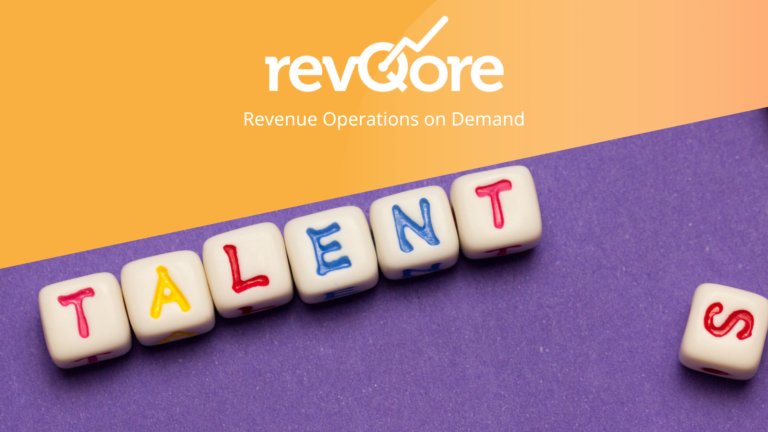As more organisations expand their revenue operations (RevOps) teams to drive alignment across sales, marketing, customer success and finance, hiring the right talent has become critical. As part of our RevOps work we often assist businesses in defining role and responsibilities clearly, ensuring that when it’s time to hire additional full-time member(s), they have a clear understanding of how to make the right choice for their business and for the member(s) joining.
This guide outlines our recommended approach for hiring RevOps talent—from defining role scope and responsibilities to structuring interviews and setting up new hires for long-term success.

1. Clarify the Role and Scope of RevOps in Your Organisation
The scope of RevOps roles can vary widely depending on your organisation’s size, maturity, and unique goals. When defining what you need from a RevOps hire there are two very clear things to look at first:
- Who is already in-seat? What skills do they have, and areas do they cover? (i.e. you might have a 2 person RevOps team, but they are both very Marketing Ops focused).
- What is the 12–24-month plan for the company? i.e. are you launching a new territory, or making acquisitions that will require different skill sets from those RevOps professionals? For Territory – you need a strong MarOps background to launch a great demand gen engine in the new country/region. For Acquisitions – you need a strong systems background to be able to migrate and integrate lots of different tools, as well as a strong sales excellence background for onboarding and training of new reps.
It is equally important to outline what success looks like for this new role. Do you expect the person to build the go-to-market (GTM) strategy, or is the focus to optimise existing processes in very specific areas? This clarity is essential, especially in the first 6-12 months, to set the RevOps hire up for success and guide the recruitment process effectively.
2. Define the Ideal Skill Set
Once the role is defined, develop a clear profile of the ideal candidate. Since RevOps professionals come from diverse backgrounds, it’s essential to identify the skills that will add the most value to your team. Key areas of expertise often include:
- Systems and Process Knowledge: Proficiency in CRM systems, automation tools, and data management is critical for driving operational efficiency and optimising workflows.
- Data Analytics: RevOps professionals have a strong foundation in data analysis and the ability to interpret trends and turn them into actionable insights.
- Strategic Alignment: Professionals who can align RevOps initiatives with company-wide goals, creating synergy between sales, marketing, and customer success.
Candidates are unlikely to have equal proficiency in all areas, so be clear about which skills need to be fully developed from the outset versus those that can be built over time. Identifying these priorities will guide you in selecting the right candidate for your team’s short to medium term needs.
3. Structure the Hiring Process for Success
A well-defined hiring process will ensure an efficient, productive experience for both candidates and hiring teams. Here’s a step-by-step approach:
- Step 1: Screening for Technical and Soft Skills Look for experience with relevant CRM platforms, data tools, and a history of collaboration across departments. Strong communication skills are a must, as RevOps professionals need to establish strong connections with sales, marketing, and customer success teams.
- Step 2: Practical Assessments Include a practical assignment to assess candidates’ problem-solving abilities and their approach to communicating complex information. A common exercise is to provide a hypothetical data set and ask candidates to analyse trends and suggest actionable insights.
- Step 3: Panel Interviews / Presentation A panel interview with key stakeholders from GTM teams allows the candidate to demonstrate their presentation skills and their ability to communicate ideas to a range of audiences.
4. Interviewing: Assess Both Skills and Strategic Thinking
The interview stage is crucial for gauging both technical and strategic skills. Here are a few example questions that can reveal a candidate’s experience, problem-solving capabilities, and cultural fit:
- “Can you describe a time when you identified a bottleneck in a revenue-related process? How did you address it?” This question uncovers analytical skills and the candidate’s approach to optimising revenue operations.
- “How have you used data to drive strategic decision-making in the past?” This question reveals the candidate’s ability to interpret data and their approach to making data-informed, strategic decisions.
- “How do you approach collaboration with sales, marketing, and customer success teams?” As RevOps professionals bridge multiple revenue-driving functions, this question highlights their collaboration skills and their understanding of each team’s goals.
5. Onboarding: Setting New Hires Up for Success
Effective onboarding is essential for integrating RevOps professionals and enabling them to add value quickly. Begin by giving new hires a clear understanding of existing processes, company objectives, and a detailed introduction to key stakeholders. Make sure they are familiar with essential tools and systems and establish clear expectations for their role. This structured onboarding will help them acclimate faster and form strong cross-functional relationships early on.
Summary
Hiring the right skills into a RevOps team requires a clear understanding of your organisation’s needs, a structured recruitment process, and a strong emphasis on both hard and soft skills.
If you’re still finalising the scope and goals of your RevOps and commercial teams, have you considered tapping into fractional RevOps expertise to help shape the roadmap and maintain operational momentum while defining the necessary skills and role(s).
